
 |
|
|
|
|
#1 |
|
Member
Join Date: Jan 2005
Location: Kansas City, MO USA
Posts: 312
|
There was a great show (I think it was on the History channel) on Dragons. Dragon lore is found everywhere on earth! It seems that everyone has had "contact" or at the least legends and myths about Dragons.
I would love to hear stories of Bakunawa and Naga that have been handed down through time (over generations)... can anyone help? Thanks in advance !!!!!!!!!!!!!!!!!!!!!!!!! |
|
|

|
|
|
#2 |
|
Member
Join Date: Dec 2004
Location: What is still UK
Posts: 5,807
|
My mother-in-law used to be a dragon but she is quite nice these days.
|
|
|

|
|
|
#3 |
|
Member
Join Date: Jan 2005
Location: Kansas City, MO USA
Posts: 312
|
Last edited by BSMStar; 20th January 2006 at 02:02 AM. |
|
|

|
|
|
#4 |
|
Member
Join Date: Jan 2005
Posts: 55
|
Bakunawa is the feared god of darkness, hopelessness and despair. According to the Hiligaynon peoples, he takes the form of a huge greenish-black dragon. Once in a while, he awakes from his slumber at the bottom of the sea, attempting to wrestle cosmic supremacy from Bathala by eating his gold and silver disks. Bakunawa can raise the fury of nature, creating tornadoes, tidal waves, earthquakes and lightning storms with just a mere thought. He, however, because of his unorganized motivation, always loses to some other god or goddess, but he always waits for his time.
The great dragon has a whole layer of eerie, calm, black waters in the Abyss, where he spends most of his time planning for his next attack on the other deities. Though his tactics are mostly disorganized, he usually calls upon powerful mortals to do his bidding. He manipulates them into exactly what he wants and then discards them when they become useless. Omens from Bakunawa come in the form of lightning or eclipses of the sun, moon or stars. |
|
|

|
|
|
#5 |
|
Member
Join Date: Jan 2005
Location: Kansas City, MO USA
Posts: 312
|
Yea, I saw this site too... but I did not know what is believable here.
http://members.fortunecity.com/quebec/lloreph.htm Looks more like a gaming site. |
|
|

|
|
|
#6 | |
|
Member
Join Date: Dec 2004
Location: zamboanga city, philippines
Posts: 132
|
Quote:
|
|
|
|

|
|
|
#7 | |
|
Member
Join Date: Dec 2004
Location: zamboanga city, philippines
Posts: 132
|
Quote:

|
|
|
|

|
|
|
#8 |
|
EAAF Staff
Join Date: Dec 2004
Location: Louisville, KY
Posts: 7,221
|
BMSstar mentions North American Indian dragons with wings:
Among my Cherokee ancestors, the Uk'tena was a huge water monster that looked like a giant snake with horns on its head and a crystal in the middle of its forhead. Very powerful and magical, killing and eating people. Only a pair of powerful giant birds were able to fight and destroy it. There is also a version of the rattal snake that has wings that has wings (featured on old Cherokee and Mississippian pottery at the time of European contact in the 1500s). |
|
|

|
|
|
#9 |
|
Member
Join Date: Dec 2004
Location: What is still UK
Posts: 5,807
|
To people in parts of PNG the crocodile is so totemic they might as well be dragons, much as they are the world over. Living with them as some Papuans do dragons are very real. here are three different styles of crocodile from PNG. The longest one is of a very soft light wood and painted,76cm. The next is a heavy dense wood 67cm and the last is burnished low fired earthen ware 18cm. I know these are not weapons but relevant to the topic. Tim
|
|
|

|
|
|
#10 |
|
Member
Join Date: Jan 2005
Location: Kansas City, MO USA
Posts: 312
|
It seems that dragons are divided into 3 main groups, those who slither (snake like), those with legs and those with wings.
They seem to be associated with water, caves and "deep, dark" forest. Similarities between dragons (worldwide), scales, horns, teeth, a general reptile like appearance, claws (if they have feet) and sometimes wings. One can see why the "dinosaur bones" explanation was used to answer the origin of the myths. The only issue I have with the dinosaur fossil connection, 1) the rarity of dinosaur fossil skulls (when was the last time you were wandering around an found one?) 2) how about finding the even more rare intact dinosaur skeleton 3) even modern scientist can not fully agree on what a living animal would have looked like after piecing all the bones together. The exact shape and color???? It's only an educated guess from known modern animal anatomy. And yet we are to believe that 1000 to 4000 years ago, they had this working knowledge of dinosaur anatomy? If true, then the origin of that knowledge sounds more interesting than dragons do. People who’s survival depends on being able to identify things and animals around them... once they identify an animal such as a croc, they know it is a croc. They may make stories up about it, but it still is a croc. The Tibetans have a mythical croc that is portrayed on the phurpa. It did not become a dragon. I think this is a western mindset to think that these people were "uneducated" and are simply misidentifying known creatures. I think we need to be more open minded. I would have to disagree that worldwide, these people are lacking in smarts.... but I really did not start this thread to debate the existence of dragons or possible dragon origins. I got started on this thread when I purchased my first Visayan sword... a Sanduko. A real beauty!!!!   Looking at the different Bakunawas on these deity hilts, I started to wonder why it is Bakunawa has a long horn or a short horn? The meaning of the four pedal flower? Being a deity, the must be stories about Bakunawa, deeds, travels, importance (after all, Bakunawa is on a lot of swords) and so on. But all dragon stories are welcome!!!!! |
|
|

|
|
|
#11 |
|
Member
Join Date: Jan 2005
Location: Kansas City, MO USA
Posts: 312
|
Hi Tim,
You sneeked your croc post in while I was typing... Great pics. But are they dragons? |
|
|

|
|
|
#12 |
|
Member
Join Date: Jan 2006
Posts: 123
|
Dragons are inspired by the reptiles in the crocodilian family. This comprises of the alligators, crocodiles, caimans, and ghareals. When Europeans went to Africa and saw the huge Nile crocodiles, they came up with the myth of dragons when describing to other fellow Europeans. The early drawings seem to represent the real crocodiles, but later, people started adding wings, and so forth, and pretty soon they were breathing fire!
 [laugh!] The Chinese also have myths and legends involving dragons, no surprise, because Chinese alligators (a very closed cousins of the American alligators) were once wide spread throughout China. They were hunted to the brink of extinction, but are now being extensively bred in captivities, in China. And crocs are also very common in South and Southeast Asia, which come in different species and size (ranging from the gigantic salt water crocodiles to the mean man-eating Indian muggers and Siamese crocodiles). [laugh!] The Chinese also have myths and legends involving dragons, no surprise, because Chinese alligators (a very closed cousins of the American alligators) were once wide spread throughout China. They were hunted to the brink of extinction, but are now being extensively bred in captivities, in China. And crocs are also very common in South and Southeast Asia, which come in different species and size (ranging from the gigantic salt water crocodiles to the mean man-eating Indian muggers and Siamese crocodiles).
|
|
|

|
|
|
#13 |
|
Member
Join Date: Jan 2005
Location: Kansas City, MO USA
Posts: 312
|
In North America, the Plains Indians had flying dragons! And they did not look anything like a croc or an alligator (usually like Pterodactyls, but not always).
In fact, I was unaware that dragon myths were native to North America before the Europeans came over until I saw this show. The scientist interviewed were trying too use dinosaur fossils and fossil foot prints as the reason for the myths (in North America and most locations... for example: dragon bones in China are fossils)... but it was amazing the similarities that all dragons have (different structures like scales)... that are not in fossils, but are guessed at today by scientist. 
|
|
|

|
|
|
#14 |
|
Member
Join Date: Dec 2004
Location: What is still UK
Posts: 5,807
|
What about Wyverns and Basilisk, not you personally

|
|
|

|
|
|
#15 | |
|
Member
Join Date: Jan 2005
Location: Kansas City, MO USA
Posts: 312
|
Quote:

|
|
|
|

|
|
|
#16 |
|
Member
Join Date: Dec 2004
Location: Europe
Posts: 2,718
|
If you want to look for dragons, you should go much further back in time. How about going back to when our forefathers excavated founds of animals long dead, maybe combined with animals still living.
|
|
|

|
|
|
#17 | |
|
Member
Join Date: Dec 2004
Location: Witness Protection Program
Posts: 1,730
|
Quote:
BSMStar, i'm confused myself, but if the bakunawas were dragons, why is it that the 'diety' on this hilts looks more human being (albeit an ugly one) than reptilian? although the flower does shows up quite a lot on these carvings; whether it'd be the cap, or the eyes, or just plain deco around the hilt. going back on the monster hilt, they kinda resemble more like an indo golok: http://old.blades.free.fr/swords/golok/gol04.htm here's another threadin reference to sanduko: http://www.vikingsword.com/vb/showthread.php?t=353 |
|
|
|

|
|
|
#18 |
|
Member
Join Date: Jan 2005
Location: Kansas City, MO USA
Posts: 312
|
Spunjer,
I remember your post... it was a big part of what inspired me to look for this sword. Totally Awesome!!!  It is my understanding that indeed Bakunawa (from Bako [bent] sawa [snake], see earlier link) is a sea dragon as are most of the naga (as I believe, in the region tend to be associated with the sea). I too use to think that it was more human looking. It seems that the more variations of Bakunawa I see - I see new things, man like, hooded dragon like, bearded dragon like, bat like and almost dog like (but the nose is definitely bat like)... and is likely due to the influence in the different areas. I like the hooded dragon versions too. I believe you have seen all of these forms pictured on the forum. |
|
|

|
|
|
#19 |
|
Member
Join Date: Dec 2004
Posts: 221
|
I must have been out during your thread Spunger, great pics and reference, nice to see what the scabbards looked like, I've kept only one example of this sword type, more long narrow blade with a hand guard. Interesting Indonesian ancestry link, shows one of the few groups which had cultural beliefs that continued after Islamic and Christian contact in the Visayas, something like the headhunters in the Northern Provinces of Luzon.
|
|
|

|
|
|
#20 |
|
Member
Join Date: Jan 2006
Posts: 123
|
Here are some pictures of Naga sculptures from Thailand.
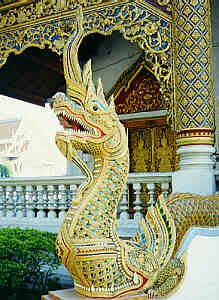  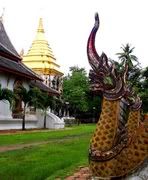 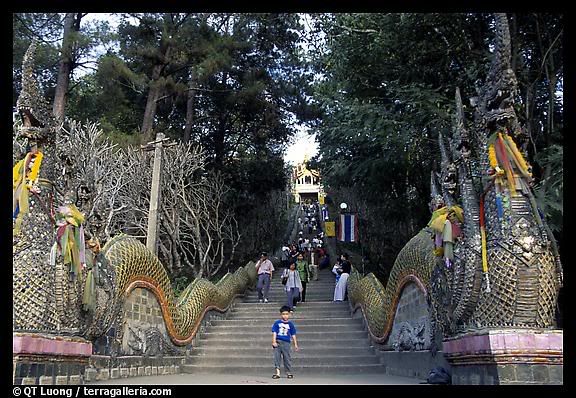 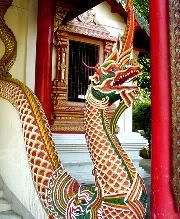 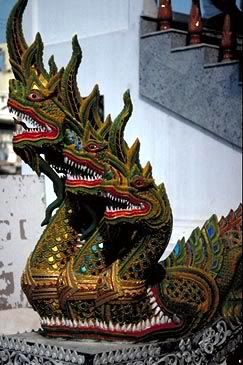
|
|
|

|
|
|
#21 | |
|
Member
Join Date: Dec 2004
Location: Witness Protection Program
Posts: 1,730
|
Quote:
http://www.viloria.com/secondthought.../00000847.html my point is, could it be possible that these so called 'diety' hilts are representations of different creatures and not just the bakunawa? you mentioned the bearded dragon, and that i can see as a representation of the bakunawa. what i'm having a hard time understanding is, most of these sundangs that has the 'diety' hilts came mostly from Panay and to an extent, Negros area. in regards to the bakunawa legend (heck, even the term 'bakunawa'), it's probably big among the cebuanos( the reason i say probably is because i'm not too familiar with the cebuano culture), but certainly not among the ilonggos (majority of the people from panay). so then, why the bakunawa as a general theme??? it might seem like i'm nitpicking here, but think maguindanao/maranao, or tausug/yakan. these tribes are closer to each other in regards to geographical location compared to the cebuanos/ilonggos, and yet you will notice that there's an ovbious difference among their styles (mindanao tribes). look, i'm no expert at this; just a curious noobie that has lots and lots of questions... btw, nice sanduko, BSMStar. mind posting a centerfold shot? 
|
|
|
|

|
|
|
#22 |
|
Member
Join Date: Jan 2005
Location: Kansas City, MO USA
Posts: 312
|
Some how I got a double post...
|
|
|

|
|
|
#23 | |
|
Member
Join Date: Jan 2005
Location: Kansas City, MO USA
Posts: 312
|
Spunjer,
In no way am I an expert... I think you are much futher down the path of knowledge in this area.  I too would like to learn more about the Visayan culture, Moro culture and Indoneasian culture, especially related to the naga. Quote:
|
|
|
|

|
|
|
#24 | |
|
Member
Join Date: Jan 2005
Location: Kansas City, MO USA
Posts: 312
|
Quote:
|
|
|
|

|
|
|
#25 | |
|
Member
Join Date: Jan 2005
Location: Kansas City, MO USA
Posts: 312
|
Quote:

|
|
|
|

|
|
|
#26 |
|
Member
Join Date: Jan 2006
Posts: 123
|
Probably, Thai arts are influence by the Balinese, also. They were contact between cultures in Southeast Asia, exchanging ideas and goods back in the ancient time. And, also, Siam kingdom once ruled part of the Indonesian Island when it was expanding its influence.
|
|
|

|
|
|
#27 |
|
Member
Join Date: Jul 2005
Location: Toronto, Canada
Posts: 1,242
|
Hello to all,
Looking at the beautiful hilts of the Sanduko swords, I can't help being reminded of the moro pira with their elongated hilts. Could the pira hilt -although functional in protecting the arm- be a stylized/simplified version of these Sanduko hilts and if so could they represent the same deity/dragon? The pictures below are both from Spunjer's old posts, I apologize for not asking permission first and I hope he won't mind. Regards, Manolo |
|
|

|
|
|
#28 |
|
Member
Join Date: Jan 2006
Posts: 123
|
I would imagine the one with the hilt made of wood would absorb the shock better on impact, and also cut down on the weight; thus, it makes it easier to use.
|
|
|

|
|
|
#29 | |
|
Member
Join Date: Jan 2005
Location: Kansas City, MO USA
Posts: 312
|
Quote:
 I think being a pira may have to do more with the blade shape than just the hilt. With the design differences (and correct me if I am wrong) it would seem that the two sword blade and hilt shapes serve different purposes as weapons. Not all Bakunawas have a long nose (some are very short - see Spunjer's avatar). It would mean that the Sanduko would alone have been the influence for the pira (a bit of a hard sale).... The Sanduko "horn" really serves no protective purpose (it seems to easily break). Mine was broken; I doubt it happened in combat (more like in rough handling). It would be nice to know why the differences for the Bakunawas. 
Last edited by Rick; 25th January 2006 at 12:59 AM. |
|
|
|

|
|
|
#30 |
|
Member
Join Date: Mar 2005
Location: USA Georgia
Posts: 1,599
|
Naga Basuki!
|
|
|

|
 |
|
|